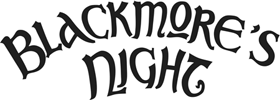 My guest today is the beautiful Candice Night, singer of Blackmore’s Night. She talks of songwriting, her love of Renaissance music and costumes, her collaboration with guitarist Ritchie Blackmore, their fans, and how fulfilling it is to play the music you want to play – even when that means you can’t get your sound on the radio.
My guest today is the beautiful Candice Night, singer of Blackmore’s Night. She talks of songwriting, her love of Renaissance music and costumes, her collaboration with guitarist Ritchie Blackmore, their fans, and how fulfilling it is to play the music you want to play – even when that means you can’t get your sound on the radio.
(And while we don’t talk about animals, Candy is such an animal lover, I’ve included some photos to show that.)
Tell me about your love affair with the Old World and its music and costumes.
Although I had always been a child of fantasy, with a wild spirit and active imagination, I had never heard Renaissance music before I met Ritchie. When we met, in 1989, he brought me up to this dark and mysterious old tudor house in the woods of Connecticut. The house had a minstrel’s gallery, tapestries, a very old world feel to it. He would always play these authentic purist Renaissance bands so that was the soundtrack to the visuals of this antique looking home as well as to the beginning of our relationship. So, still, that music conjurs up intense emotions for me of how this all began. It was music like I had never heard before. I was completely entranced by it and saw what a difference a different “soundtrack” can make.
Ritchie is much more into the true sense of history. He can tell you historical facts dating back centuries. But for me, it was the fantasy of it all. I mean, would I really like to live in the times of the plague, of no air-conditioning or sanitary conditions? No! But that imagery of the maiden waving a handkercheif out the window of the castle, the bonfires on the hills, the world lit by candlelight, sun and moon, waiting for the knight on horseback to return…all of it is so beautiful to me. No ambient noise, ambient lights stealing the stars from the sky, no road rage or air rage or cyber reality or sensationalistic, high intensity sales pitch at every turn…sounds heavenly.
When I see a man dressed in Renaissance garb…it seems to real, so honest. Its not a huge stretch, they do sell lace up shirts at Kohl’s you know! But I’d much rather see someone wearing their individuality on their sleeve than trying to look like everyone else and getting lost in the mass produced fashions that are forced upon us daily.
What were you like as a little girl, and what signs could people see that you were going to be a songwriter and an entertainer?
Well, because I was the 1st born of 3, I think my parents weren’t quiet sure what to do with me so they enrolled me into everything they could. Dancing, baton twirling, piano lessions, acrobatics, gymnastics, you name it. At age 4 they had enrolled me in singing and acting lessons which I took in Smithtown at Lillian Caran’s Masque Theater Workshop. I acted in little theater productions with her company until I was 12. My mother has often told me that I was singing full scores of broadway plays way before that, though. And I would always con my brother into doing musical performances with me for my parents when we were both very young. The picture I’m emailing you is when I was 4- my 1st on stage performance of Mary Poppins. I was a chimney sweep.
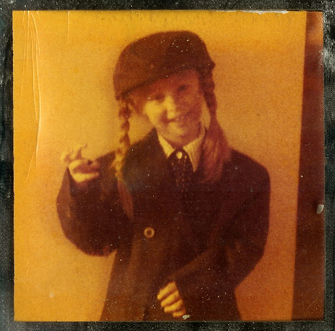
Candy, age 4. Role: chimney sweep, MARY POPPINS.
Tell me a story of one of the first times you performed.
The story attatched to the photo is that, as you know, chimney sweeps in Mary Poppins aren’t the main role, so I spent a lot of time off-stage waiting until it was my part on stage. At one point I got so bored waiting that I left the backstage area, walked out the front, past the audience and climbed into the bleachers. My parents saw me walk out and immediately thought something was terribly wrong, so they came to find me and climbed up into the bleachers with me. When they asked me what was wrong, I told them I was just waiting for my part and wanted to watch the play until it was my time to perform! I wasn’t content with just waiting around back stage–if I wasn’t in the show at the moment, I wanted to be watching the show.
It seems like you’re always learning a new (and unusual) instrument. Tell me about this.
When we first started this project it was new for me to be a “lead singer,” though I had sung backgound vocals with Deep Purple and Rainbow in 1993 and 1995-6. In 1997 we began writing, playing and recording these songs which was a huge departure from the music Ritchie had been playing for over 35 years.
Although there were some parallels, this was a much more gentle side, a side no one had seen before. I was nervous, and truth be told, when we started writing the songs, we did so for us first and foremost. We played some to our friends at parties and when they said that they would rather hear us do these songs than the usual old standards, we thought that maybe other people might like to hear them as well.
At that point, I wasn’t playing any instruments in the band. Only singing and writing lyrics. But the music was so relaxing that we quickly learned that, on tour, you can only do so many tranquil songs in a row before you’re in danger of putting the audience to sleep! So we started writing more upbeat songs.
It was during this point that we acquired a pennywhistle. It sat on the kitchen counter for 6 months before I picked it up. But when I did, and tried to play it, everything made sense. The placement of the notes, the breath, the sound–it all fit. So I started playing that on the records.
Meanwhile, Ritchie, who is obsessed by the sound of Renaissance double reed woodwinds, started collecting shawms, rauchpfifes, cornamuses, and crumhorns. It always saddened me to see them hanging on the wall collecting dust when they were created to play music! And since we do pull a lot from the Renaissance times, we also felt as if the music was missing something without the sound of authentic instruments.
Since I was already playing a wind instrument, and Ritchie had the others in the house, I started picking them up and playing them. It works really well with the other instruments we use. It gives us a sound that you don’t often come across, but it also affords us the capability to sound very purist, which is a nice vibe to pull on. We’re now even incorporating them in our louder songs. For example: I Guess It Doesn’t Matter Anymore is a rock track, but the riff is played by me on a bagpipe chanter! You don’t find that often in rock songs…

Blackmore’s Night has a very distinctive sound, mixing medieval music with a modern sound. How would you describe your music to someone who’s never heard it before?
I like to call it Fantasy Castle Music. Ritchie calls it Renn and Roll. It’s really some rock, some folk, some Renaissance, some tavern songs, some ballads and some instrumentals. The great thing about this music is we don’t fit into a neatly packed box with categories stamped on them. It’s incredibly freeing to play anything you want to, anyway you want to play it. The bad thing is, people are so used to boxes that sometimes you fall through the cracks because you can’t be catagorized.
Do you find it’s difficult to get airplay when your music is outside the box?
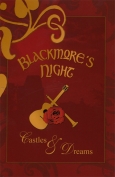 We’ve pretty much resigned ourselves to the fact that we probably won’t have a hit on commercial radio. It’s not because some of our songs can’t be played and fit in in certain genres. It’s because you have to have a major record label who knows all the right people and does all the right favors for the corporations that run the radio stations. We do get some play on NPR, and Public Broadcasting Stations nationwide aired our dvd this year, so occasionally you slip in.
We’ve pretty much resigned ourselves to the fact that we probably won’t have a hit on commercial radio. It’s not because some of our songs can’t be played and fit in in certain genres. It’s because you have to have a major record label who knows all the right people and does all the right favors for the corporations that run the radio stations. We do get some play on NPR, and Public Broadcasting Stations nationwide aired our dvd this year, so occasionally you slip in.
But I think that there is a lot of brainwashing going on with today’s music. There is so much repetition on what they want “hit” songs to be, that before you know it, you are humming along or singing the words to a song just because you’ve heard it hundreds of times throughout the week. Not because it’s good. Because it’s familiar after hearing it so often. But then, because you find yourself singing along, you think you like it and go out and buy it! You’ll probably listen to the album a couple of times, and then it gets left in a corner until they start the process all over again. It’s rampant.
With our audience, we usually get the independent thinkers. The ones who tend not to listen to the radio because they can’t stand what they’re hearing. They are looking for something new and different, and usually a friend of a friend will tell them about us. I’d rather have those people as fans anyway, because once they find you, they are very loyal and passionate about your music. We have sort of a Grateful Dead following. People follow us around the world and our audiences are so familiar, it’s almost like a family reunion at this point.
Tell me about the new album.
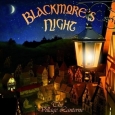 Our new album was released in April of this year. It’s called The Village Lanterne. Two seperate people last year gave us artwork with an olde world lanterne and the words stating that friendship is like a lantern lighting up the dark of night. We thought that was so beautiful, and we feel sometimes as if that is what our music is doing, too. Music has always lit the way in a dark world for me.
Our new album was released in April of this year. It’s called The Village Lanterne. Two seperate people last year gave us artwork with an olde world lanterne and the words stating that friendship is like a lantern lighting up the dark of night. We thought that was so beautiful, and we feel sometimes as if that is what our music is doing, too. Music has always lit the way in a dark world for me.
The album probably has the most variety of any album we’ve done to date. We’ve covered some songs from Ritchie’s past, also done a remake of the Ralph McTell song Streets of London. I think my favorite track on the album is “Windmills.” I am always drawn to the story songs and I feel the lyrical content came out just the way I wanted it to on this one. It is loosely based on the story of Don Quixote, but, as with my other lyrics, when delving into legends, myths or fairytales, I try to write the lyric in such a way that you won’t only be thinking about the story that has already been told, but you’ll be able to see the parallels in your own life and be able to relate to it or see someone you know in the story.
“Faerie Queen” is another favorite on this album. It really embodies the magic of being in a forest surrounded by fireflies and the incredible beauty that surrounds you. The album has done really well so far. We’ve been on top of the charts in a number of countries and we’ve even done some of the songs in German (“Old Mill Inn”) and French (“Streets of London”) for those markets. We’re still touring on this album, although we also have just finished a holiday album that will be out end of the year.
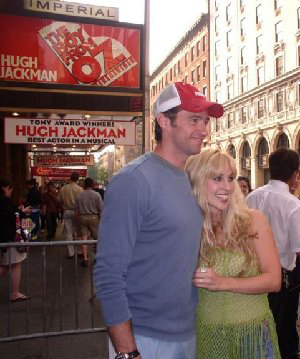
Oh, why not post a cute picture of Hugh Jackman when you can? Does there have to be a reason?
Any good stories from your latest tour? (I hope you include German castles!)
Well, as you know, we are very much into the supernatural so we often look for places that are rumored to have ghosts. At one 12th century castle we went to recently, we were looking out onto the courtyard from the 2nd story and it was about 1 a.m. All of the sudden we started hearing rattling of chains and loud moaning! It went on for about 10 minutes before it died away. There was no one there, no wind, nothing. We captured the audio on tape. It was very eerie! But right up our alley!
Can you tell me what you do when you feel exhausted, ill, cranky, hoarse, or any of the other things that would make being on tour difficult?
This is a common problem since your voice will portray all emotions you are experiencing. I never go out late at night on the road. I’m pretty boring like that. But if I get sick or lose my voice, the whole tour grinds to a halt so I have to be very careful. Lots of tea with lemon and honey and a drop of Tabasco. Lots of Ricola throat drops. No creamy foods or dairy products the day of a show. When you’re exhausted, you take ginsing and feed off the energy of the audience. That will wake you right up. When you’re cranky, I get a separate room from Ritchie. Space sometimes is a very good thing. Hoarse or ill, I don’t speak to anyone and quarantine myself. Its really pretty much common sense, but sometimes you get sick and there’s no reason why …you just have to struggle through and try not to sing so loudly or so much you strain yourself. Till you have time to heal.
Let’s talk about songwriting. First, if you could share some samples of your lyrics, and then, would you talk about how those words or songs came to you. Do you start with an emotion, an image, a melody, a string of words?
The king, he sits upon his throne,
The world’s weight on his chest,
When your mind begins to race, you’ve got no time to rest,
“Where is my clown – I need him now to chase my troubles away,”
The harlequin rushes in as his work begins for the day…
Who holds the riches, the jester or the king?
A fortress made from fool’s gold or the tears that treasure can bring?
That was from a song called Fool’s Gold, which was on our second album. I think that I incorporate a lot of different techniques when writing lyrics. Usually Ritchie will start with the music, and when he has a set melody in mind, he’ll play it for me. Then I take that tune into another room, sit quietly by myself and close my eyes and see what pictures the melody paints in my head. Often it will take me on a journey and tell me what it wants to be about. I just try to channel that visual.
When I get the idea in my head and start to write, I try to pay a lot of attention to what words I’ll use, how they flow. It’s also really important to me to not only tell the story in the song, but to have the listener hear the words, feel the moments, identify with the character and see through their eyes. I don’t just want them to hear the story, I want them to be part of it.

But I also want the message to be important. So, most of my songs will have a moral or a life lesson to them. Even if it isn’t very obvious. Like the idea from Fool’s Gold is clearly not all that glitters is gold and that you should appreciate what you have and not be envious of someone who has more because “more” often means more problems and responsibilities. Or in a song called “Ivory Tower”–in which I wrote the lyrics and the music on piano–my favorite line from that is, I feared not in the Ivory Tower, Imprisonment you’ll find, Lies within your heart your soul, your spirit and your mind. Because I feel that we have a tendency to create our own cells, our own prisions. Once we realize that, we also come to the realization that we hold the key to that cell and can free ourselves.
There have been times, though, where I have referred back to old poems I’ve written or old notes and taken an idea or a line from a piece of paper that I wrote 5 years earlier and that has sparked a whole new song. So, the process will sometimes vary for me. But it’s always the music that gives me the direction.
When did you first start writing lyrics? And do you do other kinds of writing?
I have been a closet poet since I was about 7. I still come across old writings in “child print” from then. My favorite thing in school was my English classes. I had friends who hated poetry, so when the assignment was “Write a sonnet” or prose, I would write mine and then write them for my other friends so they didn’t have to. I’ve attempted writing a short story too, in class as an assignment, and I just love being swept away into that other world of writing from someone else’s perspective. Perhaps it’s because I was enrolled in acting so young that it made it easier for me to “become” someone else. It’s more comfortable that way, sometimes. I still write a bit of poetry, though these days I tend to use bits and pieces of finished works to create songs.
What kinds of themes do you find recurring in your lyrics or other written work?
I am very inspired by nature so I find myself drawing on spirits of nature and writing often about the moon, or stars. I love finding out about old legends or myths or weaving history into the lyrics, again, that someone could relate to today.
I wrote a song called “Hanging Tree” about an old gnarled tree that used to be out here on someone’s lawn. Was it really a tree used for hanging people centuries ago? Probably not…but maybe… I love taking a story and turning it from black and white into color.
There’s also the recurring theme of love, of course. Of strength. And of magic, mystery and being in awe of the beauty that surrounds us every day.
I also find that most music on the radio these days is either really aggressive or overtly sexual with those girls shakin’ their thangs in our faces all the time. I think we have enough extremism going on today–we don’t need any more anger or over sexuality. So, in my words and our music, we’re trying to put healing and beauty into a world that sorely needs it right now.

Tell me about your involvement with Deep Purple and Rainbow, and how a heavy metal background evolved into Blackmore’s Night. Also, could you talk about how you’ve adapted a few of the classics to sound like Blackmore’s Night?
I met Ritchie when I worked for a rock radio station on Long Island in 1989. I went on tour with him in 1993, which was to be his last tour with Deep Purple, unbeknownst to us at the time. I was working for the radio station because I always wanted to be around music–it was my great escape–but I never thought I’d be singing in a band!
I was singing around the hotel room and Ritchie asked me if I would sing a background part over his Beethoven guitar solo part. They set up a mic behind curtains and in Czechoslovakia I sang (well hidden) to 15,000 people. The next day the reviews said that Jon Lord must’ve had a female voice sampled into his keyboards!
After Ritchie left that tour, he reformed Rainbow for 1 album. They recorded the album in Massachusettes in winter at a farmhouse and there was nothing around for miles and lots of snow. I guess the singer was going a bit stircrazy and had a hard time finding inspiration, so Ritchie called me at home and asked me to come up to visit. I spoke to him while I was on the Port Jefferson ferry and he told me the problem and asked me to try to write some words, knowing my passion for writing. He played me the backing track and by the time I got to the other shore I had written 14 verses. They picked 4 and a chorus out of that, and that song became “Black Masquerade.” It was a similar thing for “Wolf” to “The Moon,” “Hall of the Mountain King” and “Ariel.”
While we were in the studio, waiting for the other band members to do their parts on the songs, Ritchie and I would sit by the fireplace and come up with songs of our own. “Be Mine Tonight” we wrote up there as an anniversary gift for my parents. It was really playing as an escape from being put in that same rock box he had been in for decades. As I said, when our friends heard the songs they loved them. He was due to record another album for Japan so we asked how they would feel if it was this new kind of music? They said they’d love to put it out there as long as Ritchie kept his name in the title of the band so people knew who it was. If it was up to us we wouldn’t have our names as the band name, but that was the deal. So the name stuck.
Ritchie had been listening to Renaissance music since about 1972 when he 1st heard David Munrow and the early music consort of London. It’s all he listens to around the house and in the hotel rooms, though these days it’s Des Geyers, not David Munrow as much.
Some of the classic Renaissance tunes came from Ritchie’s favorite composer Tielman Susatto in the 1500s. Songs like the melody line from “Renaissance Faire” or “Clock Ticks On” were melodically Susatto’s. “Fires At Midnight” was originally by King Alfonse the 12th in the 10th century in Spain. “World of Stone” from the new album was originally a song called “All Voll” from Germany. “25 Years” was a sheperdic song from the Balkans. We basically take the shadow of the song and still utilize the melody line, but add other instruments, new arrangement and new lyrics. It breathes new life into an existing purist melody.

Once you and Ritchie feel you have a song, how do you involve all the other instruments and vocalists? Does each musician write in their own part? Is it tightly choreographed or does it evolve like a jam session?
Actually, a lot of what Ritchie and I write we do behind closed doors in a hotel somewhere around the world. We tend to absorb the enviornment, the architecture and the spirit of the place, especially if it’s a castle, and turn the energy we absorbed into a song. We never force it, though, we can only do it if it’s trying to come through. We wrote a song called “Queen For A Day” in Schloss Rabenstein, and “3 Black Crows” in Schloss Waldeck in Germany. So, our songs are all already written before we go into the studio. But it’s the skeleton of the song. We’ll have most of the idea in place, but when the producer comes in, he does the orchestration. Then I can add the woodwinds and Ritchie will do the guitars, hurdy gurdy and percussion.
The band never usually knows about what the songs are or how they sound until we either bring them in to perform on the track, or the 1st rehearsal for touring. But on stage, everyone injects their own personality to it. We all come from such different musical backgrounds, it makes the sound of the band really unique. The twins are operatically trained, so is the keyboard player, who is a church organist. The drummer has a punk background but also plays in theater orchestras. The bass player/rhythm guitarist used to play for Mink DeVille and we found him in a wedding band. And then you have me and Ritchie. It’s quite an interesting group.
What’s your wish for the band?
To keep going in the direction our journey is taking us. We touch so many people and get so many letter thanking us for being different in this world of cookie cutter bands; for helping them get through hard times with our music. It’s amazing.
It would be nice if our record label would think outside that box and think of more inventive ways to get people to hear our music besides only getting us reviewed in rock magazines because of Ritchie’s past.
Our audiences range from 4 year olds who still have the innocence to want to be princesses and Robin Hood, to teens who are into fantasy culture and Lord Of The Rings, to goths, to nature lovers, to Wiccans and Pagans, to career women looking for an escape from stress, to men who love Ritchie’s playing, to older people looking for a good melody. So, we will continue braving our path and reaching out to new people with each cd.
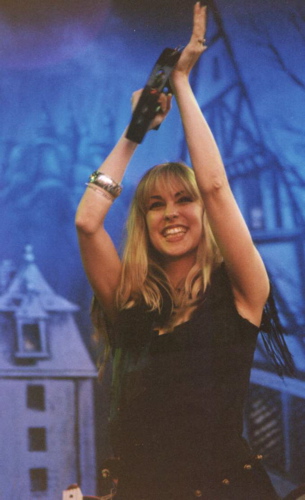
What’s your wish for the world these days?
So many people are so stressed and so rushed these days that they never take the time to stop and see the beauty all around them. See the colors of a sunset, watch a firefly, feel the breeze on their face or the grass under their feet. Without these simple gifts you can’t recharge your batteries to deal with the stress of the next day. I wish the world would slow down a bit and appreciate all that is around them. I wish this world healing and peace. To see through the eyes of a child with as much wonder. I wish it innocence. And I hope it’s not too late for that.
And finally – because a lot of people who read my blog are writers ”“ want to share the names of any of your all-time favorite books?
I love “Gifts From Eykis” by Wayne Dwyer. Also The Other Boleyn Girl by Philippa Gregory, which I just finished reading. And Renaissance poetry, too. Henry the 8th had some excellent stuff.
Thanks, Candy! xox
SUSAN HENDERSON
OCTOBER 18, 2006
